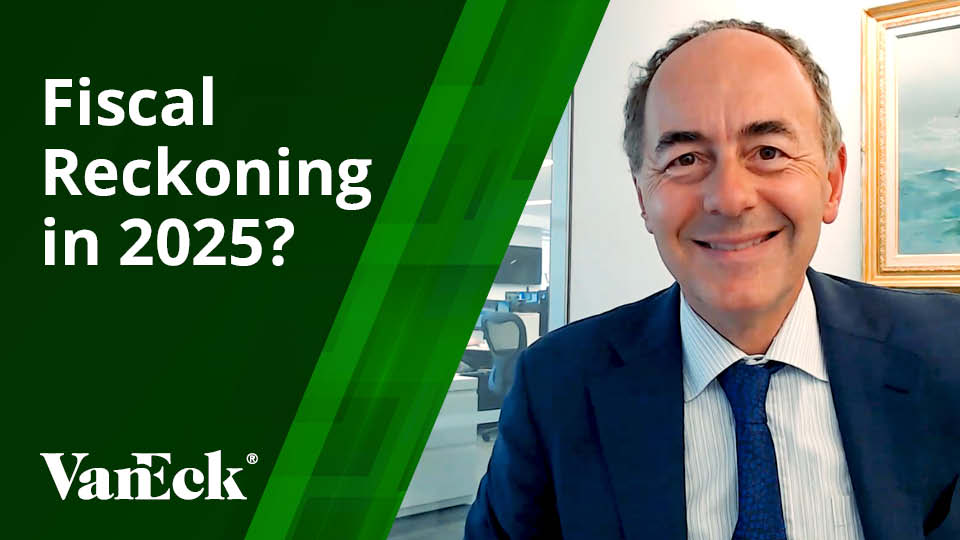2017 Investment Outlook: Filter Out Noise and Focus on Fundamentals
January 31, 2017
Read Time 6 MIN
Commodities Rebound We Predicted in 2016 Likely to Continue in 2017
TOM BUTCHER: 2016 was a pivotal year, with commodity prices bottoming out and a big shift in the interest rate narrative. What do you think will happen in 2017?
JAN VAN ECK: The events of 2016 are a major factor in how we see 2017. From a historical perspective, there were two big shifts in 2016. One shift, as you mentioned, was that commodities finally bottomed after dropping for five years, which affected almost every asset class. [See When Will Commodities Recover for our earlier prediction.] U.S. equities were affected because corporate earnings turned positive only when energy companies started recovering in the third quarter. In fixed income, high yield improved after investors realized that energy companies were not going bankrupt. Emerging markets — equities, fixed income, and foreign exchange — all bottomed because they are essentially driven by commodities. We think the commodities recovery will continue in 2017 given that most commodity recoveries last longer than a year as shown below. This also may mean that a bull market in emerging markets is gaining momentum.
Most Commodity Recoveries Last Longer than a Year

Source: VanEck; Bloomberg. Data as of January 18, 2017.
Central Banks Tighten and End Delusional Love Affair with Negative Interest Rates
The second shift was in interest rates. A year ago, Japan started moving toward negative rates. It was the height of central banks' love affair with using negative rates to try to stimulate the world economy.1Most economists thought this was delusional and that people were afraid of negative rates rather than being encouraged and more excited about doing business.
What happened in 2016 was that the move to negative rates reversed course. After the U.S. started to tighten monetary policy in December 2015, Federal Reserve Chair Janet Yellen talked about negative rates in the second quarter but walked away from them as the year progressed. The fixed income environment became more volatile in the third quarter and has stayed that way into 2017.
Trump Administration is Pro-Growth
BUTCHER: How do you expect the Trump administration to affect your outlook?
VAN ECK: As an investor, you have to filter out a lot of the noise and just look at the fundamental policies, and break it down that way. Fiscal policy is expected to be more stimulative because Trump will likely cut corporate taxes. And investors realize that monetary policy is going to have to tighten to offset that. Net-net, you have a plus and minus that balance each other out. It means a little bit more of a pro-growth outlook, and growth around the world is rising.
On trade, we do not foresee a big jolt to current policy. There will be a lot of political rhetoric around it, some changes and renegotiation of treaties, but we just cannot see it being a major growth inhibitor in 2017. On fiscal policy, will Congress, Paul Ryan, and the Democrats allow greater overall spending, or will they combine it with longer-term adjustments to the budget that reduce the U.S.' debt growth? That's the real question.
Investors Should Look More Closely at U.S. Long-Term Debt Problem…
BUTCHER: What should investors be looking for in 2017?
VAN ECK: A key question is whether Congress will fix the U.S.' long-term debt problem. If it doesn't, entitlement systems like Social Security and Medicare will likely go bankrupt in 15 years. If they bend the yield curve, I can see rates going higher, which is good in a way because bullishness will continue.
…And to China's Response to Global Pressure to "Stop" Dumping Cheap Goods
Another big discussion is about the trade deficit and how it affects emerging markets. While President Trump has talked aggressively about trade, he is actually in complete agreement with Obama and Europe on the issue because China has increased its capacity in steel and other industries and has been dumping it on the rest of the world. And the rest of the world is saying "Stop!"
The thing to look for is how China reacts to this pressure. China is the largest global economy that is the least in favor of free trade when it comes to themselves. But if China changes its stance, it could be very bullish for emerging markets because it could motivate China to get going with badly needed reforms of their state-owned enterprises, which are major players in emerging economies.
Weight-of-the-Evidence Points to Global Stocks as a Major Allocation
BUTCHER: Are you bullish on equities?
VAN ECK: We are indeed bullish on equities. We think the macroeconomic picture is very good. Although valuations are stretched, which is a slight negative, there is little reason not to be fully allocated. We are as overweight in equities as we have been in the last several years. [See Allocation: Go. Stocks! Go for our current allocation views.]
Fixed Income Investing Likely to be More Volatile in 2017
BUTCHER: What else is the firm focusing on now?
VAN ECK: In fixed income, investors have to deal with this more volatile environment, and we see four different ways they can go with it:
- Number one, you can shorten duration and go shorter-term on your funds.
- Number two, you can go for alternative types of income.
- Number three, you can take more credit risk, which is what we are most excited about. Buy high yield in the U.S. or emerging markets, for example, and earn higher interest rates as duration bounces around.
- And finally, you can say, "I don't know what to do," and invest with an unconstrained bond manager.
Additional Resources
Please see the presentation, 2017 Investment Outlook: Commodities Positive, Four Strategies for Higher Interest Rates, for more details on our Investment Outlook.
Related Insights
April 17, 2024



